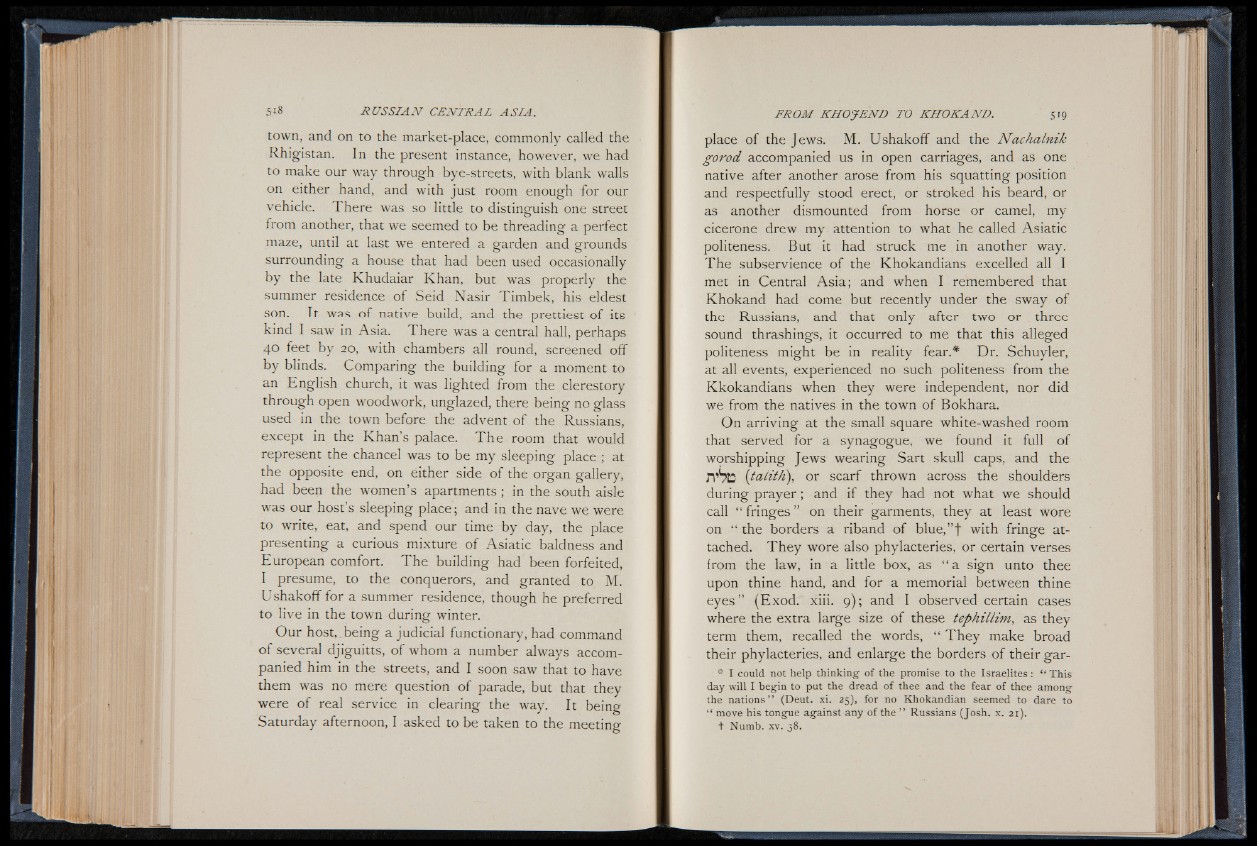
town, and on to the market-place, commonly called the
Rhigistan. In the present instance, however, we had
to make our way through bye-streets, with blank walls
on either hand, and with just room enough for our
vehicle. There was so little to distinguish one street
from another, that we seemed to be threading a perfect
maze, until at last we entered a Og arden and Ogrounds
surrounding a house that had been used occasionally
by the late Khudaiar Khan, but was properly the
summer residence of Seid Nasir Timbek, his eldest
son. It was of native build, and the prettiest of its
kind I saw in Asia. There was a central hall, perhaps
40 feet by 20, with chambers all round, screened off
by blinds. Comparing the building for a moment to
an English church, it was lighted from the clerestory
through open woodwork, unglazed, there being no glass
used in the town before the advent of the Russians,
except in the Khan’s palace. T h e room that would
represent the chancel was to be my sleeping place ; at
the opposite end, on either side of the organ gallery,
had been the women’s apartments; in the south aisle
was our host’s sleeping place; and in the nave we were
to write, eat, and spend our time by day, the place
presenting a curious mixture of Asiatic baldness and
European comfort. The building had been forfeited,
I presume, to the conquerors, and granted to M.
Ushakoff for a summer residence, though he preferred
to live in the town during winter.
Our host,.being a judicial functionary, had command
of several djiguitts, of whom a number always accompanied
him in the streets, and I soon saw that to have
them was no mere question of parade, but that they
were of real service in clearing the way. It being
Saturday afternoon, I asked to be taken to the meeting
place of the Jews. M. Ushakoff and the Nachalnik
gorod, accompanied us in open carriages, and as one
native after another arose from his squatting position
and respectfully stood erect, or stroked his beard, or
as another dismounted from horse or camel, my
cicerone drew my attention to what he called Asiatic
politeness. But it had struck me in another way.
The subservience of the Khokandians excelled all I
met in Central Asia; and when I remembered that
Khokand had come but recently under the sway of
the Russians, and that only after two or three
sound thrashings, it occurred to me that this alleged
politeness might be in reality fear.* Dr. Schuyler,
at all events, experienced no such politeness from the
Kkokandians when they were independent, nor did
we from the natives in the town of Bokhara.
On arriving at the small square white-washed room
that served for a synagogue, we found it full of
worshipping Jews wearing Sart skull caps, and the
(taiith), or scarf thrown across the shoulders
during prayer; and if they had not what we should
call “ fringes ” on their garments, they at least wore
on “ the borders a riband of blue,” f with fringe attached.
They wore also phylacteries, or certain verses
from the law, in a little box, as “ a sign unto thee
upon thine hand, and for a memorial between thine
e y e s ” (Exod. xiii. 9); and I observed certain cases
where the extra large size of these tephillim, as they
term them, recalled the words, “ They make broad
their phylacteries, and enlarge the borders of their gar-
° I could not help thinking of the promise to the Israe lite s: “ This
day will I begin to put the dread of thee and the fear of thee among
the nations” (Deut. xi. 25), for no Khokandian seemed to dare to
“ move his tongue against any of the ” Russians (Josh. x. 21).
t Numb. xv. 38.